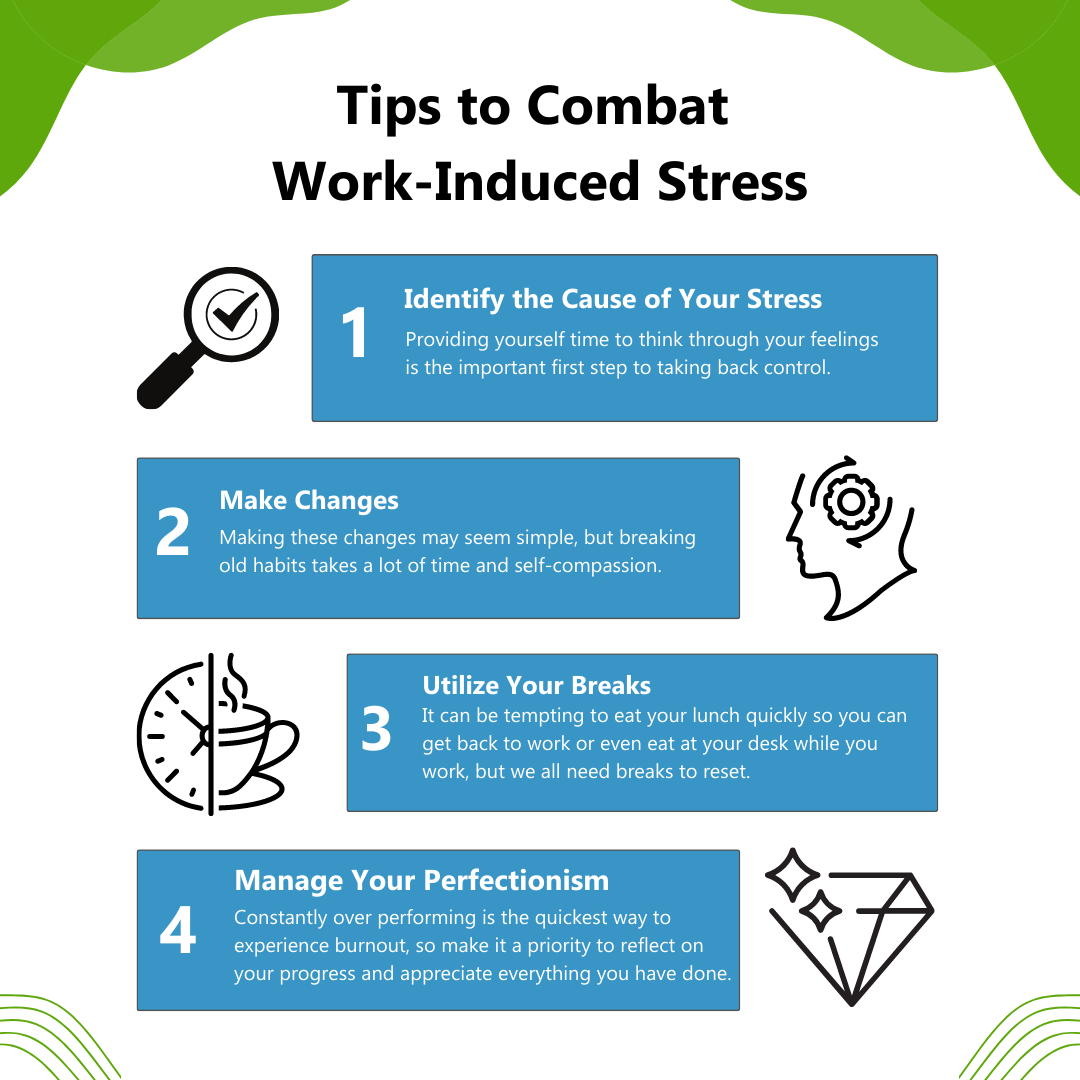
In the ever-changing ag industry, it can be easy to find yourself in a hamster wheel of overcommitments and stressful situations. The rise of hustle culture tells us that if we aren’t productive 24/7, we are simply lazy. This mindset has led many people to place their well-being at the bottom of the totem pole. Measuring our self-worth by the number of hours we put in or how efficiently we work is causing millions of people to feel exhausted and undervalued. If you find yourself stressed by your job, here are a few tips to help you take control of your happiness.
Identify what is causing your stress
There are multiple reasons why your job can be causing you stress. Since there are many moving parts of having an agriculture job, you can be led to feeling stretched too thin. Providing yourself time to think through your feelings is the important first step to taking back control. In exhausting situations, you may feel as though there is nothing you can do but this is your life, and you have the final say in what you allow to affect you. If you aren’t sure what exactly is causing your stress, provided below is a list of common work-related stressors you may be experiencing.
- Working longer hours than originally scheduled
- Agreeing to attend multiple work-related events (expos, dinners, volunteer events, tradeshows)
- Working in a toxic, overly competitive environment
- Saying “yes” to everything
- Not negotiating your salary/pay
- Taking on more tasks than you can handle (wearing yourself thin)
- Not communicating changes in your life with your employer or HR team
- Dealing with an overly demanding employer
You may be reading this list and think “this stuff is what it means to have a job”, but no, a job should never demand you place your life and mental health on the back burner. Your life does not revolve around your job, your job is meant to help you enrich your life.
Make the appropriate changes
Once you have identified your triggers, it is time to make the appropriate changes. Making these changes may seem simple, but breaking old habits takes a lot of time and self-compassion. For example, the stressors that are self-induced, such as working over or agreeing to more projects, require you to actively stop yourself from repeating those cycles. One of the best ways to stop yourself from overcommitting in the workplace is by learning to say “no”; this can be an uncomfortable task for you, but in the long run, it will be of great benefit. If you find saying “no” to requests to avoid disappointing others, here are a few tips:
- Only agree to new tasks once you’ve completed all your primary tasks. If a coworker asks for help, you can simply say “I’d love to help, but let me complete all of my tasks first, so I can dedicate my time to assisting you.”
- Find different ways to say no. If you don’t want to seem rude, finding other, more sympathetic ways to say no can help ease your feelings of guilt.
- Set strict boundaries for yourself and others. If you are someone who works overtime multiple times a week, it can be a challenge to start and stop at a reasonable time. You can stop overworking by saying that you have other commitments when a boss asks if you can stay over.
Now, if you feel as though your stressors are beyond your control, such as toxic co-workers or an employer, finding a solution can be difficult and even impossible. Working in a highly competitive or high-stakes job can put everyone on edge, creating a negative environment. If you dread going to work and find it impossible to make any changes, it may be time to reconsider your position at the company.
Speak to your employer
If you are feeling burnt out by your job and intend on staying with the company, you need to talk to your manager. Schedule a meeting with your boss to explain to them how you have been feeling, a good employer will hear you out and work with you to create a plan moving forward. Doing this will not only present a possible solution but will also allow you to finally express your emotions and get the extra weight off your chest.
Take time off
Whether it’s a couple of days off or a whole week, take some time off to disconnect from your job and focus on your mental health. Use this time to do the things that make you happy. Let your coworkers know you’ll be away and can’t take any calls or handle any work-related business. You will also need to set boundaries for yourself, whether that means deleting work apps or not checking your email. We understand that a career in agriculture can be demanding, but setting boundaries is the only way you’ll be able to keep your mind off work.
Utilize your breaks
Taking breaks during your shift is essential to de-stress and re-energize for the rest of the day, especially during your lunch break. It can be tempting to eat your lunch quickly so you can get back to work or even eat at your desk while you work, but humans need breaks from strenuous tasks. According to research done by Tork, employees who take lunch breaks are more likely to be satisfied with their jobs. Even taking short breaks throughout the day to stretch or snack can positively impact your mental health. If you are someone who tends to forget to eat or take breaks, schedule your break reminders on a digital calendar.
Manage your perfectionism
Wanting to perform at the highest level possible is human nature. We want to continue doing and being better, but the need to always improve and focus on perfection can come at a cost. Give yourself grace and congratulate your efforts instead of criticizing and “fixing” your hard work. Constantly overperforming is the quickest way to experience burnout, so make it a priority to reflect on your progress and appreciate everything you have done.

Conclusion
It can be easy to place all our energy in our jobs, we may not notice at first, but overworking and toxic work environments can have a serious impact on our mental health. If you find yourself feeling anxious or stressed, take the necessary steps to prioritize your happiness, whether that means not working past a certain time or leaving a job altogether. Sometimes, the ag industry places productivity and efficiency on a pedestal and leaves little room for managing our well-being. You may not want to seem lazy in the eyes of your coworkers or boss but remember that prioritizing your mental health is never lazy. Making a plan to create a healthier relationship with your job and setting boundaries is the key to happiness in a world that forgets the importance of mental health.
AgHires can help you find your next job. Search for jobs in agriculture, food production, horticulture, and other related industries at AgHires.com.
Get more Career Tips here or follow us on Facebook and Twitter.
Sign Up for Our Email Newsletter and get ag facts weekly, plus new jobs in agriculture.






